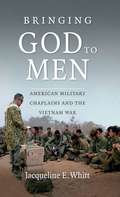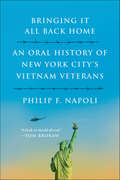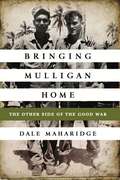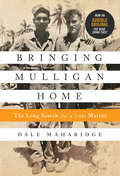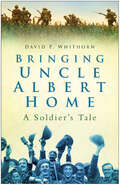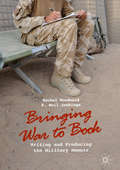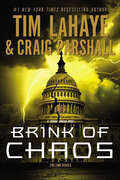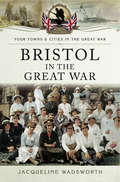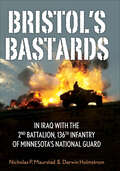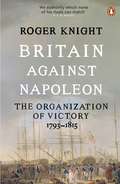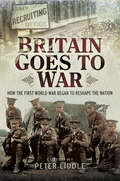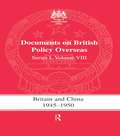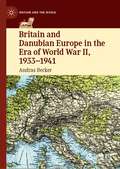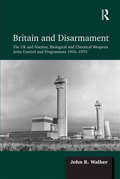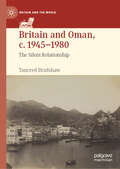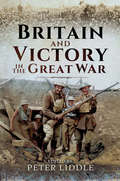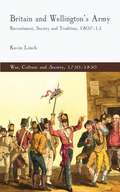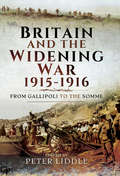- Table View
- List View
Bringing God to Men
by Jacqueline E. WhittDuring the second half of the twentieth century, the American military chaplaincy underwent a profound transformation. Broad-based and ecumenical in the World War II era, the chaplaincy emerged from the Vietnam War as generally conservative and evangelical. Before and after the Vietnam War, the chaplaincy tended to mirror broader social, political, military, and religious trends. During the Vietnam War, however, chaplains' experiences and interpretations of war placed them on the margins of both military and religious cultures. Because chaplains lived and worked amid many communities--religious and secular, military and civilian, denominational and ecumenical--they often found themselves mediating heated struggles over the conflict, on the home front as well as on the front lines. In this benchmark study, Jacqueline Whitt foregrounds the voices of chaplains themselves to explore how those serving in Vietnam acted as vital links between diverse communities, working personally and publicly to reconcile apparent tensions between their various constituencies. Whitt also offers a unique perspective on the realities of religious practice in the war's foxholes and firebases, as chaplains ministered with a focus on soldiers' shared experiences rather than traditional theologies.
Bringing It All Back Home: An Oral History of New York City's Vietnam Veterans
by Philip F. NapoliFeatured in the NY Emmy-nominated documentary New York City's Vietnam Veterans (CUNY-TV)A collection of heartrending oral histories that topples assumptions about the people who served in VietnamThe Vietnam War was a defining event for a generation of Americans. But for years, misguided and sometimes demeaning clichés about its veterans have proliferated widely. Philip F. Napoli's Bringing It All Back Home strips away the myths and reveals the complex individuals who served in Southeast Asia. Napoli was one of the chief researchers for Tom Brokaw's The Greatest Generation, and in the spirit of that enterprise, his oral histories recast our understanding of a war and its legacy.Napoli introduces a remarkable group of young New Yorkers who went abroad with high hopes only to find a bewildering conflict. We meet a nurse who staged a hunger strike to promote peace while working at a field hospital; a paratrooper whose experiences on the battlefield left him with emotional scars that led to violence and homelessness; a black soldier who achieved an unexpected camaraderie with his fellow servicemen in racially tense times; and a university administrator who helped to create New York City's Vietnam Veterans Memorial. Some of Napoli's soldiers became active opponents of the war; others did not. But all returned with a powerful urge to understand the death and destruction they had seen. Overcoming adversity, a great many would go on to lead ambitious lives of public service. Tracing their journeys from the streets of Brooklyn and Queens to the banks of the Mekong, and back to the most glamorous corporations and meanest homeless shelters of New York City, Napoli reveals the variety and surprising vibrancy of the ex-soldiers' experiences. "For almost everyone the time in Vietnam was the most exciting and the most alive time of your life," one veteran recalls. He adds: "I still have this little trick . . . When I lie down and go to sleep, if there's something bothering me, I say, 'You're warm, you're dry, and there is no one shooting at you.'"
Bringing Mulligan Home
by Dale MaharidgeSergeant Steve Maharidge returned from World War II an angry man. The only evidence that he'd served in the Marines was a photograph of himself and a buddy tacked to the basement wall. On one terrifyingly memorable occasion his teenage son, Dale, witnessed Steve screaming at the photograph: "They said I killed him! But I didn't kill him! It wasn't my fault!"After Steve died, Dale Maharidge began a twelve-year quest to face down his father's wartime ghosts. He found more than two dozen members of Love Company, the Marine unit in which his father had served. Many of them, now in their eighties, finally began talking about the war. They'd never spoken so openly and emotionally, even to their families. Through them, Maharidge brilliantly re-creates Love Company's battles and the war that followed them home. In addition, Maharidge traveled to Okinawa to experience where the man in his father's picture died and meet the families connected to his father's wartime souvenirs.The survivors Dale met on both sides of the Pacific Ocean demonstrate that wars do not end when the guns go quiet-the scars and demons remain for decades. Bringing Mulligan Home is a story of fathers and sons, war and postwar, silence and cries in the dark. Most of all it is a tribute to soldiers of all wars-past and present-and the secret burdens they, and their families, must often bear.
Bringing Mulligan Home: The Long Search for a Lost Marine
by Dale MaharidgeSergeant Steve Maharidge returned from World War II an angry man. The only evidence that he'd served in the Marines was a photograph of himself and a buddy tacked to the basement wall. On one terrifyingly memorable occasion his teenage son, Dale, witnessed Steve screaming at the photograph: "They said I killed him! But I didn't kill him! It wasn't my fault!”After Steve died, Dale Maharidge began a twelve-year quest to face down his father's wartime ghosts. He found more than two dozen members of Love Company, the Marine unit in which his father had served. Many of them, now in their eighties, finally began talking about the war. They'd never spoken so openly and emotionally, even to their families. Through them, Maharidge brilliantly re-creates Love Company's battles and the war that followed them home. In addition, Maharidge traveled to Okinawa to experience where the man in his father's picture died and meet the families connected to his father's wartime souvenirs.The survivors Dale met on both sides of the Pacific Ocean demonstrate that wars do not end when the guns go quiet-the scars and demons remain for decades. Bringing Mulligan Home is a story of fathers and sons, war and postwar, silence and cries in the dark. Most of all it is a tribute to soldiers of all wars-past and present-and the secret burdens they, and their families, must often bear.
Bringing Uncle Albert Home: A Soldier's Tale
by David P WhithornPrivate Albert Turley, was just an ordinary British soldier of the First World War. He died on the Somme for King and Country. He didn't win any medals for gallantry and has no known grave. Like thousands more soldiers, he left neither letters nor diaries from which to reconstruct his story.This is the story of one man's search for his distant relative, describing Private Turley's active service with the 3rd Battalion the Worcestershire Regiment that led to his death in one of the most infamous battles of the twentieth century. David Whithorn's painstaking reconstruction of Albert's story from surviving records and histories led to a pilgrimage following his footsteps to the Somme hillside where he fell in August 1916.What sets this book apart from the many others written about the soldiers and campaigns of the First World War is its dual function as both a tightly focused history of the 3rd Worcestershires and a detective story that eventually reveals what happened to Private Albert Turley.
Bringing War to Book: Writing And Producing The Military Memoir
by Rachel Woodward K. Neil JenkingsThis book explores how military memoirs come to be written and published. Looking at the journeys through which soldiers and other military personnel become writers, the authors draw on over 250 military memoirs published since 1980 about service with the British armed forces, and on interviews with published military memoirists who talk in detail about the writing and production of their books. A range of themes are explored including: the nature of the military memoir; motivations for writing; authors’ reflections on their readerships; inclusions and exclusions within the text; the memories and materials that authors draw on; the collaborations that make the production and publication of military memoirs possible; and the issues around the design of military memoirs' distinctive covers.Written by two leading commentators on the sociology of the military, Bringing War to Book offers a new and original argument about the representations of war and the military experience as a process of social production. The book will be of interest to students and scholars across a range of disciplines including sociology, history, and cultural studies.
Brink of Chaos (The End Series #3)
by Craig Parshall Tim LaHayeIn the third installment of The End series, Joshua Jordan remains in Israel during his self-imposed exile out of the reach of U.S. authorities who have trumped-up false criminal treason charges against him.Joshua Jordan stands accused of treason. The charges paint him as a domestic terrorist who used his own defense-contracting firm and the Roundtable group to infiltrate the Department of Defense and manipulate America's national-security apparatus so it would conform to his own political agenda. Joshua has taken asylum in Israel until his wife and attorney, Abigail, can prove his innocence and guarantee him a fair trial.Following the nuclear attack by Russia, Israel has been cleaning up the bodies of dead enemy soldiers for 7 months and setting out on its 7-year plan—both per the prophecies in Ezekiel. As corruption in high government offices threaten to block the election of a worthy presidential candidate by all means necessary—including the unthinkable—Israel&’s leadership is tempted to sign a &“peace&” proposal initiated by the UN under the authority of Coliquin. Joshua is convinced Coliquin may well be the prophesied Anti-Christ and that his peace plan is a trap to destroy Israel.Are the recurring dreams Joshua is having about the coming rapture from God? And is the end sooner than anyone expects?From New York Times bestselling author Tim LaHaye, creator and co-author of the world-renowned Left Behind books, and Craig Parshall, this epic series chronicles the earth-shattering events leading up to the Apocalypse foretold in Revelation.Futuristic Christian suspenseThe third installment of The End seriesBook 1: Edge of ApocalypseBook 2: Thunder of HeavenBook 3: Brink of ChaosBook 4: Mark of EvilIncludes discussion questions for book clubs
Bristol in the Great War (Your Towns & Cities in the Great War)
by Jacqueline WadsworthWhen war was declared in 1914 the people of Bristol erupted in patriotic excitement - but what was it like when the cheering died down?This book tells the city's unique story during those grinding years, when women risked their lives filling shells with mustard gas, factories turned out chocolate and cigarettes for the troops, Shirehampton's fields were full of war horses, and Filton's nascent aeroplane industry took off. Also described are the lives of the women who waited at home for news of their men at the Front, the long shop queues and blackouts, the bone-shaking military vehicles that rumbled past their homes, and the kindness shown to the traumatized refugees from Belgium.Jacqueline Wadsworth's extensive research brings Bristol's story to life using contemporary accounts and high-quality photographs, many of which have never been published before.As seen in The Bristol Post, Western Daily Press and Gazette Series.
Bristol's Bastards: In Iraq with the 2nd Battalion, 136th Infantry of Minnesota's National Guard
by Darwin Holmstrom Nicholas P. MaurstadMinnesota’s toughest farm boys take on Iraqi insurgents in one of the most irreverent and outrageous memoirs to come out of the Iraq War.When they deployed for Iraq, Bravo Company, 2nd Battalion, 136th Infantry Regiment of the Minnesota National Guard, was mostly composed of farm kids from the Midwest. But make no mistake—these boys could replace a tank track on the side of the road using nothing but a crescent wrench, Zippo lighter, and a two-by-four. Once they arrived, they fought alongside the Marine Corps in Anbar province through the deadliest period of Operation Iraqi Freedom.Bravo Company earned the nickname “Bristol’s Bastards” after USMC Colonel George Bristol, commanding officer of the IMEF Headquarters Group, adopted this band of fierce warriors as one of his own. Specialist Nick Maurstad, a member of Bristol’s Bastards, brings to life the experience of fighting in Iraq: kicking down doors, dodging IEDs, battling insurgents in the small towns surrounding Fallujah, and trying to help one another survive in the deadliest place on earth.
Britain & Rome: The Exposure of a Renaissance Fraud
by P.J. O'GormanThis is a bold reassessment of one of the pivotal points in British history. PJ O’Gorman analyses the sources for the period from Julius Caesar’s first forays into these islands to the invasion under the Emperor Claudius and the conclusions he reaches are nothing short of radical and call into question much of the accepted narrative of Roman invasion and conquest. The author starts by showing that Caesar’s initial cross-Channel adventures were motivated not so much by seeking the glory of taming primitive savages but to gain control of an economic powerhouse. His treatment of the period leading up to the Claudian invasion and the invasion itself is even more shocking. Most significantly he argues convincingly that two of the most important Roman sources underpinning the conventional narrative are in fact Renaissance fakes and that their acceptance has distorted the interpretation of modern archaeological evidence. Meanwhile he reinstates a discounted British source. The result is a startlingly different version of Britain’s early history.
Britain 1940: The Decisive Year on the Home Front
by Anton RipponOn New Year’s Day 1940, the people of Britain looked back on the first four months of the Second World War with a sort of puzzled unease. Wartime life was nothing like what they had imagined. Unlike the First World War there was no fighting on the Western Front. Indeed, there was no Western Front. There had been no major air attacks. Four days into the war German bombers had approached the East Coast but no bombs were dropped. Everyone carried their gasmask but there was no poison gas. Petrol was the only commodity rationed. There was no noticeable shortage of food, which was as available now as it had been before Hitler invaded Poland. Young men called up to join the forces were largely idle. They certainly were not fighting the Germans. In January 1940, life in wartime Britain was simply an inconvenient version of life in peacetime. Even the hitherto strictly enforced blackout regulations were relaxed when it became obvious that, because of them, people were being killed in road accidents. On New Year’s Eve 1940, Britain was deep in the throes of war. In September the Germans had launched what was to be an eight-month bombing campaign that targeted every one of Britain’s major cities. By the end of 1940, German air raids had killed 15,000 British civilians. The so-called Phoney War had ended in May, when Hitler attacked the Low Countries. After Dunkirk, with the Luftwaffe poised just across the English Channel, and with the very real threat of invasion, the Second World War was now anything but phoney.
Britain Against Napoleon: The Organization of Victory, 1793-1815
by Roger KnightFrom Roger Knight, established by his multi-award winning book The Pursuit of Victory as 'an authority ... none of his rivals can match' (N.A.M. Rodger), Britain Against Napoleon is the first book to explain how the British state successfully organised itself to overcome Napoleon - and how very close it came to defeat.For more than twenty years after 1793, the French army was supreme in continental Europe, and the British population lived in fear of French invasion. How was it that despite multiple changes of government and the assassination of a Prime Minister, Britain survived and won a generation-long war against a regime which at its peak in 1807 commanded many times the resources and manpower?This book looks beyond the familiar exploits of the army and navy to the politicians and civil servants, and examines how they made it possible to continue the war at all. It shows the degree to which, as the demands of the war remorselessly grew, the whole British population had to play its part. The intelligence war was also central. Yet no participants were more important, Roger Knight argues, than the bankers and traders of the City of London, without whose financing the armies of Britain's allies could not have taken the field. The Duke of Wellington famously said that the battle which finally defeated Napoleon was 'the nearest run thing you ever saw in your life': this book shows how true that was for the Napoleonic War as a whole.Roger Knight was Deputy Director of the National Maritime Museum until 2000, and now teaches at the Greenwich Maritime Institute at the University of Greenwich. In 2005 he published, with Allen Lane/Penguin, The Pursuit of Victory: The Life and Achievement of Horatio Nelson, which won the Duke of Westminster's Medal for Military History, the Mountbatten Award and the Anderson Medal of the Society for Nautical Research. The present book is a culmination of his life-long interest in the workings of the late 18th-century British state.
Britain Goes to War: How the First World War Began to Reshape the Nation
by Dr Peter LiddleThe First World War had a profound impact on British society and on British relations with continental Europe, the Dominions, the United States and the emerging Soviet Union. The pre-war world was transformed, and the world that we recognize today began to take shape. That is why, 100 years after the outbreak, the time is right for this collection of thought-provoking chapters that reassesses why Britain went to war and the preparations made by the armed forces, the government and the nation at large for the unprecedented conflict that ensued.A group of distinguished historians looks back, with the clarity of a modern perspective, at the issues that were critical to Britain's war effort as the nation embarked on the most intense and damaging struggle in its history. In a series of penetrating chapters they explore the reasons for Britain going to war, the official preparations, the public reaction, the readiness of the armed forces, internment, the impact of the opening campaign, the experience of the soldiers, recruitment, training, weaponry, the political implications, and the care of the wounded.
Britain Goes to War: How the First World War Began to Reshape the Nation
by Dr Peter LiddleThe First World War had a profound impact on British society and on British relations with continental Europe, the Dominions, the United States and the emerging Soviet Union. The pre-war world was transformed, and the world that we recognize today began to take shape. That is why, 100 years after the outbreak, the time is right for this collection of thought-provoking chapters that reassesses why Britain went to war and the preparations made by the armed forces, the government and the nation at large for the unprecedented conflict that ensued.A group of distinguished historians looks back, with the clarity of a modern perspective, at the issues that were critical to Britain's war effort as the nation embarked on the most intense and damaging struggle in its history. In a series of penetrating chapters they explore the reasons for Britain going to war, the official preparations, the public reaction, the readiness of the armed forces, internment, the impact of the opening campaign, the experience of the soldiers, recruitment, training, weaponry, the political implications, and the care of the wounded.
Britain and Ballistic Missile Defence, 1942-2002 (Strategy and History #Vol. 8)
by Jeremy StockerBritain was the first country to come under sustained ballistic missile attack, during 1944-45. Defence against ballistic missiles has been a persistent, if highly variable, subject of political policy and technical investigation ever since. The British Second World War experience of trying to counter the V-2 attacks contained many elements of subsequent responses to ballistic missile threats. After the war, a reasonably accurate picture of Soviet missile capabilities was not achieved until the early 1960s, by which time the problem of early warning had largely been solved. From the mid-1960s on, British attention shifted away from the development of the country's own defences towards the wider consequences of US and Soviet deployments. After the end of the Cold War there was renewed interest in a limited active-defence capability against Third World missile threats. This well-researched book is primarily aimed at students of post-war British foreign and defence policies, but will also be of interest to informed general readers.
Britain and China 1945-1950: Documents on British Policy Overseas, Series I Volume VIII (Whitehall Histories #Vol. Viii)
by S. R. Ashton G. Bennett K. A. HamiltonAn examination of Britain's relations with China from the end of the World War II to the outbreak of the Korean War in 1950. This volume demonstrates how Britain's effort to recover something of its pre-war commercial pre-eminence in China were handicapped by its post-war financial weakness.
Britain and Danubian Europe in the Era of World War II, 1933-1941 (Britain and the World)
by Andras BeckerThis book is a study of British official attitudes towards the Danubian countries (Hungary, Czechoslovakia, Romania and Yugoslavia) from Hitler’s rise to power in 1933 to the year 1941, a period that marked serious but fruitless British political and economic efforts to unite this unruly part of Europe against Nazi ascendancy. Set against an international backdrop of regional revanchist, revisionist and irredentist tendencies, particularly in Hungary and Bulgaria, the book explores how these movements affected international relations in the region as they aimed to overturn the territorial order set down in Versailles following the Great War to restore the status quo of a more glorious national past. Offering fresh insights into the British-East Central and South East European relationship, the book charts the shifts in British official policy towards Danubian Europe, amidst competing regional nationalisms and the sudden and abrupt shifts in British global priorities during the early part of World War II.
Britain and Disarmament: The UK and Nuclear, Biological and Chemical Weapons Arms Control and Programmes 1956-1975
by John R. WalkerSince the use of poison gas during the First World War and the dropping of atomic bombs on Japan at the end of the Second World War, nuclear, biological or chemical (NBC) weapons have registered high on the fears of governments and individuals alike. Recognising both the particular horror of these weapons, and their potential for inflicting mass death and destruction, much effort has been expended in finding ways to eliminate such weapons on a multi-lateral level. Based on extensive official archives, this book looks at how successive British governments approached the subject of control and disarmament between 1956 and 1975. This period reflects the UK's landmark decision in 1956 to abandon its offensive chemical weapons programme (a decision that was reversed in 1963, but never fully implemented), and ends with the internal travails over the possible use of CR (tear gas) in Northern Ireland. Whilst the issue of nuclear arms control has been much debated, the integration of biological and chemical weapons into the wider disarmament picture is much less well understood, there being no clear statement by the UK authorities for much of the period under review in this book as to whether the country even possessed such weapons or had an active research and development programme. Through a thorough exploration of government records the book addresses fundamental questions relating to the history of NBC weapons programmes, including the military, economic and political pressures that influenced policy; the degree to which the UK was a reluctant or enthusiastic player on the international arms control stage; and the effect of international agreements on Britain's weapons programmes. In exploring these issues, the study provides the first attempt to assess UK NBC arms control policy and practice during the Cold War.
Britain and Italy in the Era of the First World War: Defending and Forging Empires (Cambridge Military Histories)
by Stefano MarcuzziThis is an important reassessment of British and Italian grand strategies during the First World War. Stefano Marcuzzi sheds new light on a hitherto overlooked but central aspect of Britain and Italy's war experiences: the uneasy and only partial overlap between Britain's strategy for imperial defence and Italy's ambition for imperial expansion. Taking Anglo-Italian bilateral relations as a special lens through which to understand the workings of the Entente in World War I, he reveals how the ups-and-downs of that relationship influenced and shaped Allied grand strategy. Marcuzzi considers three main issues – war aims, war strategy and peace-making – and examines how, under the pressure of divergent interests and wartime events, the Anglo-Italian 'traditional friendship' turned increasingly into competition by the end of the war, casting a shadow on Anglo-Italian relations both at the Peace Conference and in the interwar period.
Britain and Oman, c. 1945–1980: The Silent Relationship (Britain and the World)
by Tancred BradshawThis book examines the relationship between Britain and Oman since the end of the Second World War up until the Iranian revolution. Particular focus is given to the political and economic development of the state, together with Britain’s various overt and covert interventions, principally in the three decades between 1945 and 1975. The author addresses themes which have previously been unexplored in the literature on Oman and British Imperialism in the Arabian Peninsula, such as the establishment of the Sultan’s Armed Forces, and the impact of the oil industry. The book shows that Sultan Said bin Taymur (r. 1932-1970) enjoyed considerable ‘agency’ in his relations with the British who found it very difficult to persuade him to implement economic development and establish relations with his neighbours. Britain’s relations with successive sultans were deliberately concealed, including the contribution of special forces in fighting Oman’s insurgencies. It is widely argued that when Qaboos bin Said became Sultan in 1970, a ‘renaissance’ occurred, however many newly discovered documents have called this into question. They reveal how an inexperienced Sultan came to power with covert British support, and Whitehall’s direction of the war in Dhofar from afar. These documents highlight the extent of British intelligence cooperation and psychological warfare planning to counter the insurgents in Dhofar. However, as this book demonstrates, the Sultan also relied on non-British advisors, known as the ‘mafia’, to secure financial assistance and establish diplomatic ties across the Middle East. Finally, the book details how British defence assistance continued well beyond the retreat from empire in the Persian Gulf.
Britain and Victory in the Great War
by Peter LiddleHow can we begin to make sense of the Great War now that over 100 years have passed since it ended with the defeat of Germany, Austria-Hungary, the Ottoman empire and Bulgaria, and the collapse of Tsarist Russia? The conflict had such a profound influence on world history that is it difficult to reconcile the different perspectives and draw clear conclusions. That is why this thought-provoking collection of original essays on the outcome of the war and its aftermath is of such value.It completes the trilogy of ground-breaking volumes conceived and edited by Peter Liddle which presents the latest scholarly thinking about the Great War from an international perspective. The first two volumes Britain Goes to War and Britain and the Widening War made this stimulating new writing accessible to a broad readership and this final volume has the same aim.A group of over twenty expert contributors reconsider the military reasons for the outcome of the fighting and look at the consequences for the principal nations involved. They explore the way the war and the peace settlement shaped the twentieth century and had an enduring impact within Europe and beyond.
Britain and Wellington�s Army
by Kevin LinchBritain was France's most implacable enemy during the Napoleonic Wars yet was able to resist the need for conscription to fill the ranks of its army and sustain Wellington's campaigns in Portugal and Spain. This new study explains how the men were found to replenish Wellington's army, and the consequences on Britain's government, army and society.
Britain and World War One
by Alan G. SimmondsThe First World War appears as a fault line in Britain’s twentieth-century history. Between August 1914 and November 1918 the titanic struggle against Imperial Germany and her allies consumed more people, more money and more resources than any other conflict that Britain had hitherto experienced. For the first time, it opened up a Home Front that stretched into all parts of the British polity, society and culture, touching the lives of every citizen regardless of age, gender and class: vegetables were even grown in the gardens of Buckingham Palace. Britain and World War One throws attention on these civilians who fought the war on the Home Front. Harnessing recent scholarship, and drawing on original documents, oral testimony and historical texts, this book casts a fresh look over different aspects of British society during the four long years of war. It revisits the early war enthusiasm and the making of Kitchener’s new armies; the emotive debates over conscription; the relationships between politics, government and popular opinion; women working in wartime industries; the popular experience of war and the question of social change. This book also explores areas of wartime Britain overlooked by recent histories, including the impact of the war on rural society; the mobilization of industry and the importance of technology; responses to air raids and food and housing shortages; and the challenges to traditional social and sexual mores and wartime culture. Britain and World War One is essential reading for all students and interested lay readers of the First World War.
Britain and a Widening War, 1915–1916: From Gallipoli to the Somme
by Peter LiddleIn a series of concise, thought-provoking chapters the authors summarize and make accessible the latest scholarship on the middle years of the Great War 1915 and 1916 and cover fundamental issues that are rarely explored outside the specialist journals. Their work is an important contribution to advancing understanding of Britains role in the war, and it will be essential reading for anyone who is keen to keep up with the fresh research and original interpretation that is transforming our insight into the impact of the global conflict. The principal battles and campaigns are reconsidered from a new perspective, but so are more general topics such as military leadership, the discord between Britains politicians and generals, conscientious objection and the part played by the Indian Army. The longer-term effects of the war are also considered facial reconstruction, developments in communication, female support for men on active service, grief and bereavement, the challenge to religious belief, battlefield art, and the surviving vestiges of the war. Peter Liddle and his fellow contributors have compiled a volume that will come to be seen as a landmark in the field. Contributors: Andrew BamjiClive BarrettNick BosanquetJames CookeEmily GlassGraeme GoodayAdrian GregoryAndrea HetheringtonRobert JohnsonSpencer JonesPeter LiddleJuliet MacdonaldJessica MeyerDavid MillichopeNS NashWilliam PhilpottJames PughDuncan RedfordNicholas SaundersGary SheffieldJack SheldonJohn SpencerKapil Subramanian
Britain and the American Revolution
by H. T. DickinsonThis is the first modern study to focus on the British dimension of the American Revolution through its whole span from its origins to the declaration of independence in 1776 and its aftermath. It is written by nine leading British and American scholars who explore many key issues including the problems governing the American colonies, Britain's diplomatic isolation in Europe over the war, the impact of the American crisis on Ireland and the consequences for Britain of the loss of America.
